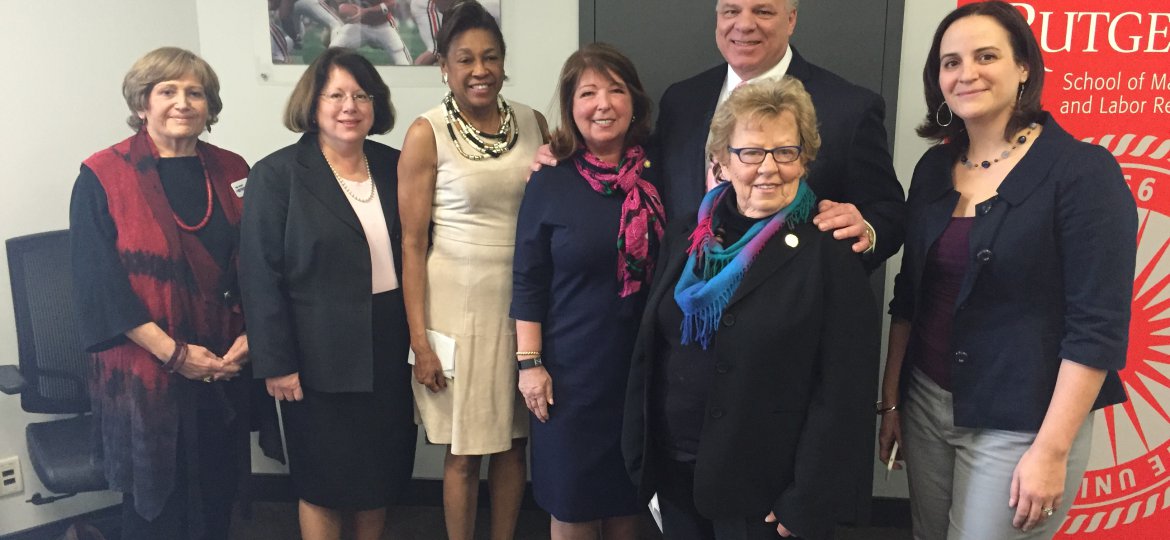
TRENTON – Senate Majority Leader Loretta Weinberg and Senator Sandra Cunningham announced today that the Senate will vote to override the governor’s veto of legislation that would help to secure equal pay for women in New Jersey.
The override vote is scheduled for next Monday, December 19th.
“The sad reality is that women still earn less than men across the country and in New Jersey,” said Senator Weinberg. “The current laws don’t do enough to protect against wage discrimination. This legislation would help to close the wage gap in our state. It is an important measure for both our residents who are working hard and not getting the pay they deserve, but also for our children and grandchildren who should grow up in a society that treats them fairly and equitably.”
The bill, S-992, which passed both houses of the Legislature with overwhelming, bipartisan, veto-proof majorities, was vetoed by the governor on May 2nd of this year. It was approved 28-4 by the Senate, including six Republicans, and 54-14 by the Assembly. Two additional Senate Democrats who weren’t available for the prior vote have pledged their support.
“Racial and gender inequality still exists and, while we have made progress, change isn’t occurring fast enough,” said Senator Cunningham. “As a new generation of young women prepares to enter the workforce, they should do so with the assurance that they will be treated as equals no matter their gender, race, or religion. This legislation will bring transparency to wages and help to combat wage discrimination. This will help to change the culture of inequality that unfortunately still exists in the workplace and help to close the wage gap between men and women.”
If enacted, the legislation would establish the strongest pay equity law in the country.
“Eighty cents on the dollar is not only unfair to women, it’s bad for their families and for the economy,” said Assemblywoman Pamela Lampitt, the Assembly sponsor of the bill. “Equal pay isn’t just a women’s issue, when a women gets equal pay her family income rises and her entire family is better off. When all employees are paid fairly, the economy is more prosperous.”
In 2016, women in the United States make only 79 cents for every dollar a man makes. In New Jersey, on average, women make 80 cents for each dollar a man makes, according to information from the National Women’s Law Center. The wage gap is much greater for women of color: African-American women make 58.1 cents for every dollar a man does; for Latinas, the wage statistic is 42.7 cents, the NWLC reported. Other reports indicate that the gap is increasing for young women just entering the workforce, which could “keep them trapped in a career track with lower pay.”
Senate President Steve Sweeney gave his support to the effort and the issue.
“It is shameful that in this day and age, women continue to make less than men for doing the same work,” said Senator Sweeney. “Equal pay for equal work is a simple, common-sense principle that should also be a basic right. There should not even be a debate on the issue, much less a veto. This is a matter where equality for women can be measured in dollars and inequality is revealed by paychecks.”
The vetoed legislation would make changes to the law to combat pay discrimination by creating greater transparency surrounding compensation and greater protections for employees. The bill would prohibit unequal pay for “substantially similar” work, and would require an employer to demonstrate a different rate of compensation is the result of specific factors, such as training and education. It would restart the statute of limitations each time a paycheck is issued in furtherance of discrimination, reflecting language in the federal Lilly Ledbetter Act; however, it would allow back pay for the entire period of time in which the violation is continuous, a provision that is stronger than the federal law’s two-year cap.
Also participating were Senator Linda Greenstein, Senator Nilsa Cruz-Perez and Senator Bob Smith.
In New Jersey, the amount today’s wage gap would cost a woman over a 40-year career, known as the “lifetime wage gap,” is $477,080. Compared to a white man, over a 40-year career, it would cost an African American woman $1.2 million, a Latina $1.7 million, an Asian American woman $416,560, and a Native American woman $1.2 million, according to research from the National Women’s Law Center. If wages continue to change at the current pace, women in New Jersey will not see equal pay until the year 2055, the Institute for Women’s Policy Research reported.
Joining in support were Laurel Brennan, Secretary-Treasurer, AFL – CIO; Dena Mottola Jaborska, Associate Director, NJ Citizen Action; Adele LaTourette, Director of NJAHC; Christine Sadovy, Advocacy Director, Planned Parenthood; Estina Baker, Senior Campaign Lead, CWA; Nancy Erika Smith, Civil Rights Attorney, Partner and Co-Founder of Smith Mullin;Bruce Davis, Economic Development Chair, NAACP NJ State Conference; Patricia Teffenhart, NJ Coalition Against Sexual Assault; Nancy Hedinger, President, League of Women Voters; Douglas Johnston, AARP NJ Manager of Advocacy; Jean Pierce, Health Professionals and Allied Employees; Bridget Devane, Public Policy Director, Health Professionals and Allied Employees (AFT); Deb Huber, President, NOW-NJ; Carol Cohen, President, AAUW; Virginia Little, AAUW; Renee Koubiadis, Executive Director, Anti-Poverty Network, and Reverend Sara Lilja, Director, LEAMNJ.

